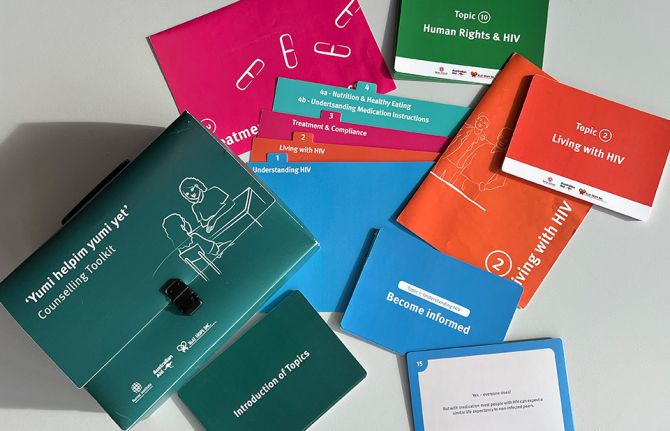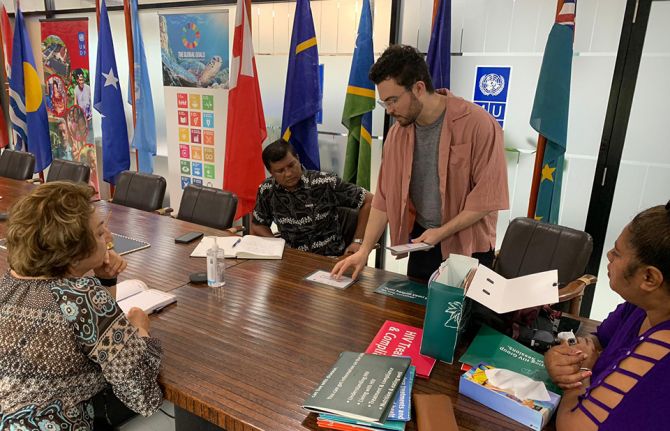



Feature Story
Crowdfunding for community-led services in Fiji’s fast growing HIV epidemic
14 July 2025
14 July 2025 14 July 2025“There is no such thing as peer support here,” says Mark Shaheel Lal, founder of Living Positive Fiji. “We are starting from zero.”
When other parts of the world were wrestling with soaring HIV rates during the 1990s and early 2000s, Fiji was hardly affected. With a population of under one million, HIV remained under the radar in the South Pacific island chain.
But there has been an exponential increase in recent years. Since 2014, the number of new HIV infections in Fiji has risen ten-fold. Last year the number of newly diagnosed people tripled from 2023 levels
In January the Government of Fiji declared an HIV outbreak in response to the sharp increase in new diagnoses. Although its HIV Surge Strategy seeks to rapidly expand HIV testing and treatment, most people still aren’t accessing the services they need.
Last year just a quarter of people living with HIV in Fiji were receiving antiretroviral therapy. Concerningly, a third of those who have been diagnosed are not on treatment.
Mr Lal is among a group of stakeholders that is working not only to spread the word that HIV medicines work, but to support people to access care. He is also among the few people living openly with HIV in Fiji.
“There is this idea that you come from a small island and everyone knows each other, so the stigma here is high. I want to help reduce that,” he explains.
Dean Cassano is a Senior International Health Project Officer at Burnet Institute, an Australian public health research organization with a focus on underserved communities.
“The intervention we are proposing is a community-led response and what that looks like is peers counselling other peers. Somebody living with HIV is enabled, trained and mentored with the skills and methodology to counsel other people living with HIV. The core objective is to improve treatment adherence,” Mr Cassano explains. “We know that when someone talks to a peer they can ask about misconceptions, fears, advice on how to have a baby or how to tell a partner. They would be getting holistic support, so they know there is a way through.”
At present, people who learn they are HIV-positive in Fiji are referred to one of three sexual health clinics. Many simply never show up.
“They are too embarrassed… too scared,” Mr Lal says.
The new approach would immediately introduce newly diagnosed people to a peer counsellor. Peer counsellors would also play a key role in supporting clients as they access treatment, contact tracing, and reaching out to those who have stopped coming to the clinic.
The Institute had worked on an HIV Peer Counselling Toolkit for neighboring Papua New Guinea (PNG) where new infections are also rising dramatically. Together with Igat Hope, PNG’s main people living with HIV organization, they developed culturally specific modules. The Australian Government funded this initiative as part of the Sexual Reproductive Health Integration Project.
“There are ten topics that someone newly diagnosed with HIV needs to know about how to live well,” Mr Cassano explains.
Burnet has collaborated with partners in Fiji to adapt the toolkit, for example including local specifics in sections on food and alcohol. Fiji requires an additional module on harm reduction. Among newly diagnosed people who are currently receiving antiretroviral therapy, half contracted HIV through injecting drug use.
Now comes the next step—mobilizing and training these peer counselors. With no resources immediately available, the partners raised more than AUD$146000 through a crowdfunding campaign which ended in June. Now the training begins.
“This began as a result of us seeing a need and hearing from local partners that they want this but realizing that there is no money. The long-term plan is that this peer support is embedded into the national HIV response and is a core tenet for post-diagnosis support. Our hope is that it is sustained but first it must start,” Mr Cassano said.



